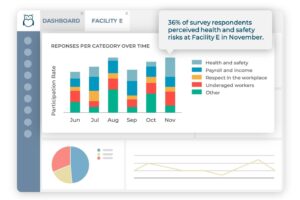Global regulations are changing how supply chains operate. A raft of mandatory regulations and voluntary commitments require businesses to report on the actions they’re taking to improve human and labor rights for their workers. But it’s the workers themselves that know what’s really happening in facilities. That’s why meaningful worker engagement is becoming an essential element for assessing a company’s human rights impacts.

Global regulations are changing how supply chains operate.
Using Worker Engagement Technology (WE Tech) to engage directly with workers brings multiple benefits, from greater transparency and identifying hidden issues to gaining personal insights and encouraging positive change. Recently, Ulula partnered with the Social & Labor Convergence Program (SLCP) as one of its service providers to deploy We Tech in its assessments across global supply chains.
What is the Social & Labor Convergence Program?

Source: SLCP
SLCP is a multi-stakeholder initiative with over 250 signatories, representing manufacturers, brands, civil society, regulators, industry associations, service providers and more. SLCP’s mission is to improve working conditions by deploying a common social assessment and capturing accurate and comparable data. This enables stakeholders to better identify human and labor rights risks in their supply chains, engage with workers on the ground about their issues, reduce audit fatigue, and make a stronger impact with their policies and processes.
Workers are the engine driving real change.
Worker insights on day-to-day conditions are unparalleled. Evidence has shown that engaging workers makes them feel more involved, and more motivated.
 To collect deeper, granular data on the social and labor conditions of workers in the supply chain, SLCP understands the importance of going directly to workers and spotlighting their voice. Ulula are specialists in amplifying worker voice, collecting insights through surveys, and presenting them in an accessible platform. They’re well placed to deliver worker-centered insights that can be integrated into SLCP assessments.
To collect deeper, granular data on the social and labor conditions of workers in the supply chain, SLCP understands the importance of going directly to workers and spotlighting their voice. Ulula are specialists in amplifying worker voice, collecting insights through surveys, and presenting them in an accessible platform. They’re well placed to deliver worker-centered insights that can be integrated into SLCP assessments.
The SLCP and Ulula Partnership

The partnership between SLCP and Ulula will allow facilities implementing SLCP’s WE Tech and Converged Assessment Framework (CAF) to gather more accurate and relevant data, providing facilities with an opportunity to gain a deeper understanding of working conditions and bringing SLCP signatories closer than ever to the needs of the workers in their supply chains.
Susanne Gebauer, Senior Assessment Data and Quality Manager at SLCP, says:

Susanne Gebauer, SLCP
“SLCP believes in facility-led action and supports those facilities that are ready to take charge of their performance, and who understand the benefits in doing so. With WE Tech, we hope to empower facilities and workers. Our design of the worker survey has been very intentional from the beginning – we strive to educate and support facilities to use this tool for the long-term journey to improvement.”
The data generated by SLCP can reduce the burden on companies, unlocking their resources for targeted improvement programs based upon the problems identified in Ulula’s surveys.

Antoine Heuty, Ulula
Antoine Heuty, CEO, Ulula explains: “Worker surveys provide practical and scalable tools to foster worker engagement and learning while helping to strengthen risk identification and prevention. They also serve as a critical component for effective human rights due diligence as a result.”
What is WE Tech and how does it work?
Ulula uses expert-designed and field-tested questionnaires to measure worker feedback across key indicators of well-being, working conditions, environmental impacts, and health and safety. In this case, Ulula deploys surveys that are standardized and incorporated into the SLCP assessment verification process.
However, the true value of this data is measured in the levels of worker engagement. One of the weaknesses of the non-digital approach is low levels of worker engagement, and lack of scalability. It’s important that workers feel free to speak their minds about their experiences in the workplace. That’s why anonymity and inclusivity functions, and functionality on worker’s personal devices, make all the difference. Anonymity means workers don’t have to worry about retaliation, they can speak their minds, providing the kind of impartial insights that SLCP users need to make the right interventions. In order to foster inclusivity, workers are given the ability to engage with the survey through text, websites or IVR, thus removing common barriers to participation.
To ensure optimal outcomes for Ulula’s surveys, a process of planning and onboarding is carried out, followed by stakeholder outreach and the promotion of the survey among factories and workers, the deployment of the survey, and then a data reporting stage. Due to the high levels of worker engagement involved, the data collected from these surveys are actionable, and can drive targeted improvements in company practices based upon the real risks as identified by workers.
How Workers and Manufacturers Work for One Another
With comparable data also comes improved transparency and eased compliance with international reporting and due diligence laws. These innovations will drive improved working conditions and human rights for supply chain workers.
Getting accurate data that reflects the reality of workers’ lived experiences in the field, factories, and other workplaces has been difficult. In the past, businesses have relied on in-person audits or hotlines to manage human rights risks. However, with long tail supply chains in the textile and apparel sectors stretching across countries, delivering equitable policies manually takes time and money. Without consistent data on these indicators, companies can’t be sure their action translates to impact. The way forward will be found in digitalization and scalability.
Lead the Way to Compliant, Worker-Friendly Supply Chains
Collaboration is the future for this sector. Cooperation between different service providers and stakeholders, such as through SLCP, has immense potential to transform the lived experience for supply chain workers. These partnerships can enable them to use their own voice to raise standards for workers and businesses around the globe.
Beyond the work with SLCP, Ulula’s end-to-end grievance resolution, case management and analytics, surveys, localized expertise and capacity building functions enable workers to drive the identification and mitigation of risks in supply chains through scalable, digitalised stakeholder engagement tools.
Ulula’s partnership with SLCP is a bold step towards the mainstreaming of digital worker engagement policies. The future of HRDD is digital. Get in touch to learn more.

